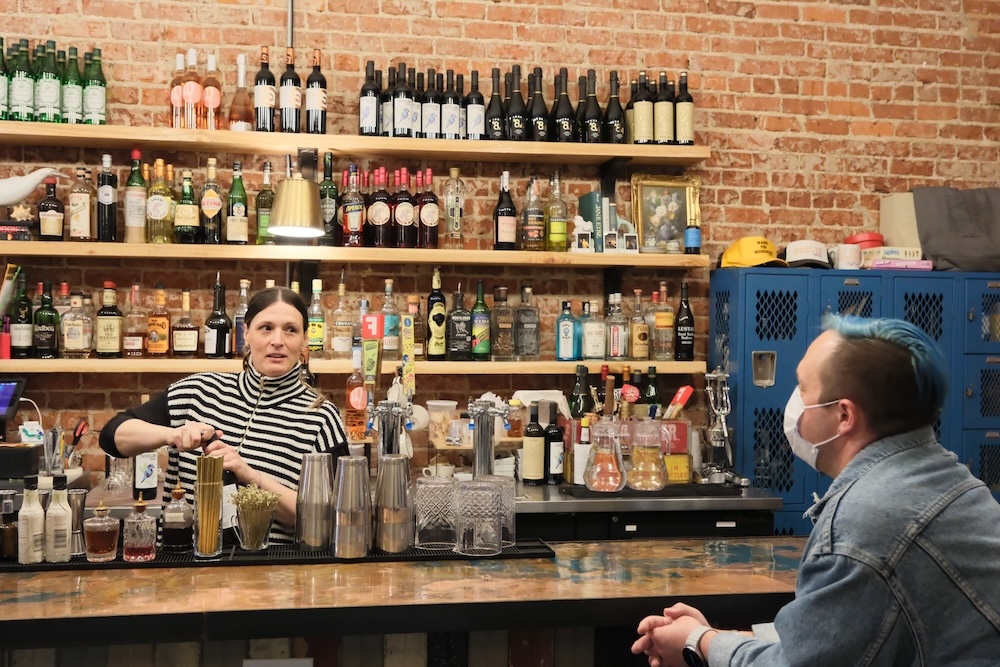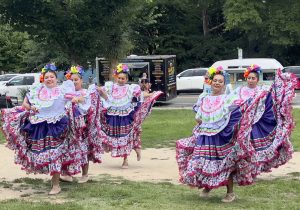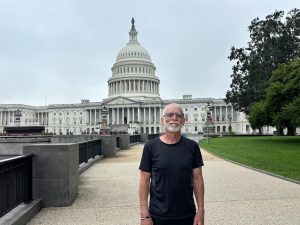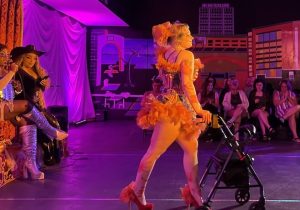It looks pretty much like any other classroom. School desks are pushed together to create a hollow rectangle. The chairs are small and stiff, and the students spill out of them. There’s a laminated periodic table of the elements plastered to one wall.
But the desks are lined with drinks, from red wine to negronis. And the students don’t fit your typical school demographic: some are young and perky, but most are middle-aged with early wrinkles on their faces. A few are old enough to retire.
On a recent Sunday evening, all eyes are trained on the teacher, Lindsey Andrews, who is writing the lesson plan on the whiteboard after emerging from behind the bar, where she mixed drinks for her students just moments earlier. She and her co-teacher, Phillip Stillman, count the heads in the room, like kindergarten teachers on a field trip, making sure all 19 students are accounted for.
“These kinds of numbers for Foucault?” Stillman says. “It’s about f——g time.” The room laughs.
Class has begun.
At Durham’s Night School Bar, bartenders become teachers and bargoers become students. Andrews and Stillman both have Ph.D.s in English from Duke University. Andrews, the owner, started the bar on Zoom in 2020 and has taught for over a decade, and Stillman is also a working psychotherapist.
The bar also hosts music performances and movie screenings. But its main gig is education: humanities and arts classes, taught by experts, open to anyone. The school offers tiered payment ranging from free to hundreds of dollars, so people pay what they can. And there are no grades, credits, or degrees: This is learning purely for the sake of it (while enjoying a few drinks).
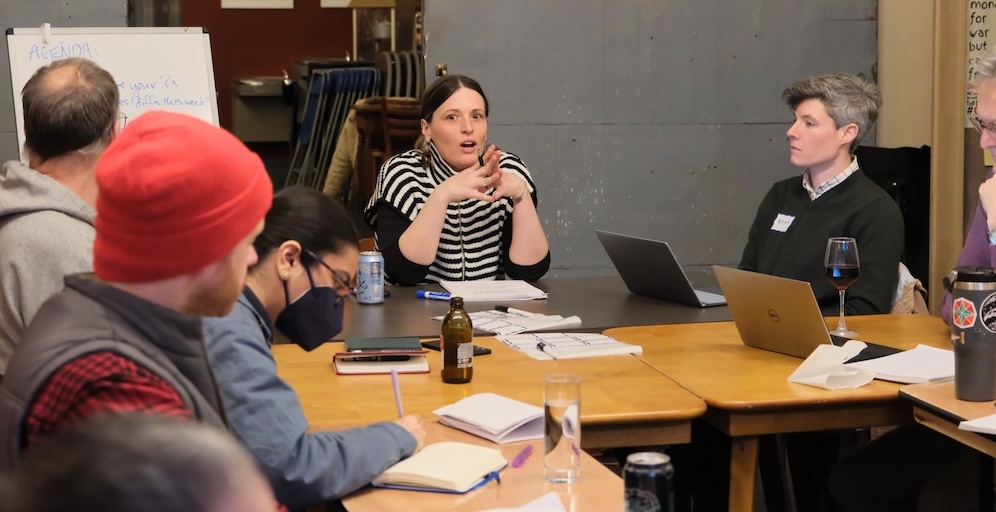
The course offerings range from “Queer Ecology” to “Ugly: Aesthetic, Ethics, History.” This particular class, a two-hours-a-week, five-week course co-taught by Andrews and Stillman, is called “The Anti-Essential Foucault.”
Despite the low stakes and mild absurdity of the concept, it really does feel like school.
“How many people actually did the reading?” Stillman asks at the beginning of class, a question of practicality, not judgment: Stillman just wants to know how much time to spend summarizing the text. “We know you have jobs, people to care for, and yourselves to care for,” Andrews reassures everyone.
In “The Anti-Essential Foucault,” Stillman explains, the class will begin by examining French philosopher Michel Foucault’s most recent texts — those written right before his death in 1984 — and work back through time to understand the many nuances of his outlook on life.
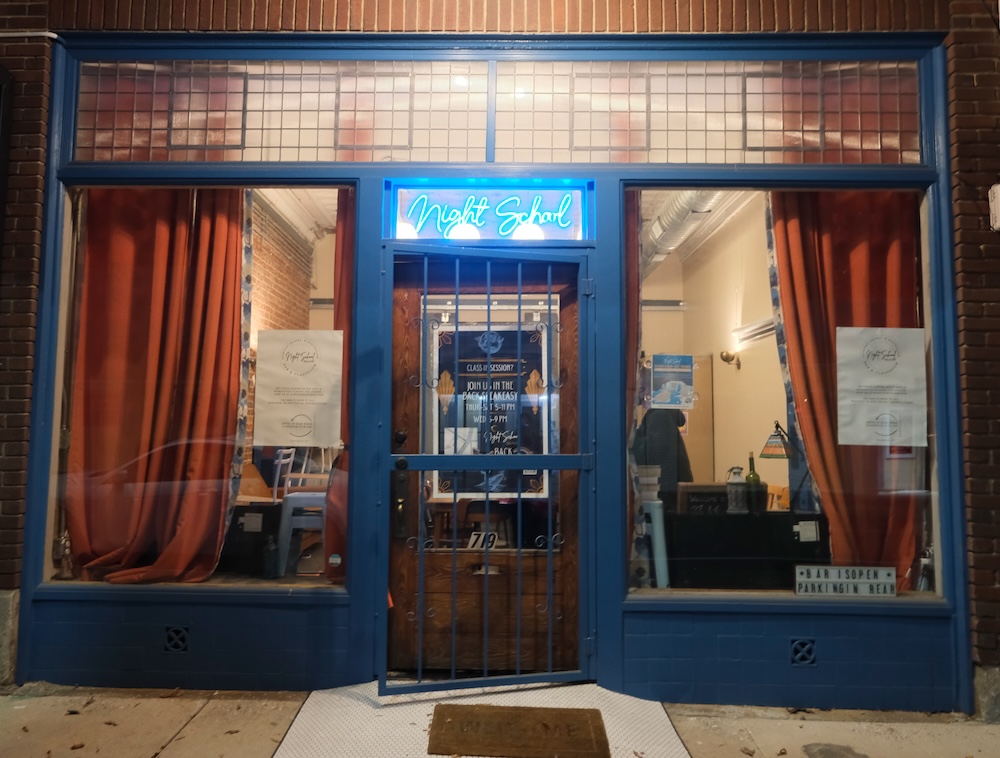
Both Stillman and Andrews are big fans of his work. “His books will f–k you up,” Stillman warns the class. It’s not the first gleeful cursing from the teacher, but it’s still jarring.
Students come here for all sorts of reasons. Some simply miss being students. One only recently moved to Durham and is taking the class to immerse in the community. Another works in office administration, and finds that his job uses only a select set of his intellectual muscles, and he’s craving a workout for the others.
Luke VanderHart, 39, the head of technology for a green energy investment company in Durham, likes the classes so much that he’s taken several and says they remind him of the best of his college years.
“They’re like the seminar classes in college, not the big lecture ones, but the seminars were always the best ones anyway,” he said. “And as an adult, you can read books on your own, but that’s very different from having someone to explain it to you and being able to engage with other people on it. It really brings it to life.”
He finds that the drinking — though he’s never seen anyone drunk in class — facilitates the learning, too. “I mean, how many great philosophical conversations have you had while slightly under the influence?” he asked. “It works!”
Plus, the format meets his needs perfectly.
“Busy adults like to go to bars sometimes, and doubling that up with some really intellectual learning is pretty cool.”
Back in class, Stillman, who wears a flannel-lined denim jacket over a T-shirt that reads “MISFITS,” primes the class for the first lecture: “The readings we assigned for today were about as accessible as Foucault gets, so buckle up.”
Despite the age difference, typical classroom clichées apply: Some students talk plainly in an earnest plea to be understood, while some students prefer to profess, establishing their intellect. Andrews and Stillman welcome it all.
At the mid-class break,. Andrews dashes from her spot by the whiteboard to behind the bar, where she begins refilling her students’ drinks. The crowd mingles and sips on their second round, and for a moment, the space surrenders to being a bar once again.
When they start again, Stillman directs the students’ attention to “a long-ass sentence” towards the end of the day’s reading. Foucault’s central tenet, Stillman explains, is that human beings are terrible at doing anything new. Who we are, and how we identify ourselves, is completely limited by our societal context. An example: romantic love, as a concept, did not exist 300 years ago. The term homosexual wasn’t coined until 150 years ago. Our identities, our goals, our lives are merely a product of history.
“How the f–k do we break through?” Stillman asks.
A man bends over and stares at the ground before shifting and leaning back, arms and legs crossed. Perhaps he is processing this heavy intellectual query, or perhaps he is simply too large for his elementary-school chair.
According to Foucault, you must strive to create and become something truly new, Stillman explains.
Like working adults who are also students. Like a bar that is also a school.
At top: Owner Lindsey Andrews makes a drink for co-teacher Phillip Stillman. Photo by Sofie Buckminster – The 9th Street Journal

